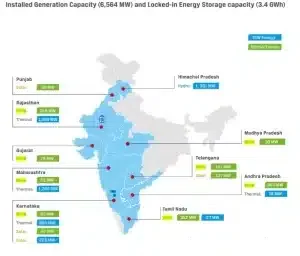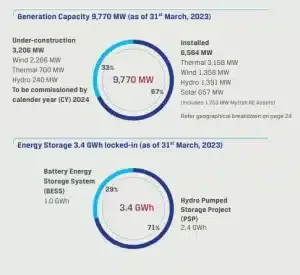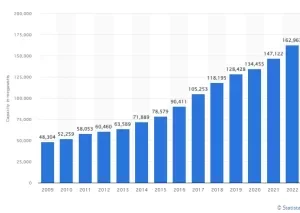JSW Energy has sealed a significant deal with Reliance Power, acquiring a 45 MW wind project for a staggering Rs 132 crore. The agreement is a remarkable milestone in JSW Energy’s renewable energy expansion journey, solidifying its commitment to sustainability and clean energy initiatives.
By leveraging Reliance Power’s expertise and infrastructure in the renewable energy sector, JSW Energy aims to maximize the efficiency and output of the acquired project.
JSW Energy- Reliance Power Wind Project- A Joint Effort to Sustainability
Reliance Power was the first company in India to launch the gigantic 45 MW Wind power project at Vashpet in the Sangli District of Maharashtra, India. The system operates a huge 2.5 MW capacity turbine. As per media reports, this unit commenced operations in the year 2013 and is currently under a power off-tak agreement with Adani Electricity.
Reliance Power has been clearing its debt obligations with multiple banks like DBS, ICICI, and Axis. The mega Rs 132 crore wind power deal with JW Renewable Energy is a smart move by Reliance Power to become 100% debt-free by the end of this financial year. The transaction is expected to be finalized by May 21, 2024.
The company advocates the utilization of renewable energy sources to reduce their dependence on fossil fuels. It has upgraded its portfolio by investing in sustainable power projects like solar, wind, hydroelectricity, etc. pan India.
Image: Pan-India presence of JSW renewable energy projects
source: JSW energy
The ultimate goal is to tackle environmental challenges, promote green energy, and assist India in fulfilling its net-zero pledge to the Paris Agreement.
Carbon offset project portfolio of Vashpet Wind:
-
- Reliance Energy earns 0.7 million carbon credits through its Vashpet Wind entitlements.
- The company indicates that it is poised to achieve a reduction of 74,828 MMT CO2 equivalent per annum.
As mentioned on their website, Reliance Power actively employs “market-based mechanisms” like the Clean Development Mechanism (CDM) under the United Nations Framework Convention on Climate Change (UNFCCC) to meet international standards to fuel their climate-friendly projects.
JSW Energy has issued an official statement to confirm the deal. It said,
“A Business Transfer Agreement has been signed between the parties and the transaction is subject to other customary approvals standard to a transaction of this size.”
Unlocking JSW Energy’s Futuristic Renewable Energy Mission
JSW Renewable Energy (Coated) Limited, is a fully owned subsidiary of JSW Neo Energy Limited. Currently, it has an operating capacity of 6.6 GW across thermal, hydro, solar, and wind generation.
JSW Energy is taking a step forward by acquiring the 45 MW Wind Project from Reliance Power, aiming to become a 20 GW company. The company boasts of making substantial investments in renewable sectors like green hydrogen and energy storage.
Sajjan Jindal, Chairman and MD of JSW Group says,
“I am confident that these new-age businesses can change the future of JSW Energy for all our stakeholders – our shareholders, suppliers, customers, and our employees.”
Thus, this historic deal aligns with the company’s mission to reduce the negative impact of its operations on people, communities, and the environment. It further offers sustainable solutions to enhance business performance and quality.
We have fetched the following data from the JSW Energy resources:
-
- In 2021 it had set an ambitious target for a 50% reduction in carbon footprint by 2030, and achieve carbon neutrality by 2050, by transitioning towards renewable energy.
- The company aims to reach 10 GW installed capacity as well as 1 GWh of storage capacity in 2024.
Image: Energy Generation and Storage Capacity of JSW Energy for March 2023
source: JSW Energy Reports
Apart from the 45 MW wind project, JSW plans to commission the company’s first greenfield wind power project at Tuticorin later this year. This demonstrates the company’s remarkable growth in the energy sector and its capability in executing projects.
JSW Energy leads the energy transition, aligning with India’s Paris Climate Agreement commitments. It believes in prioritizing energy security and reliable power while expanding its progress in the renewable sector.
India, currently the world’s third-largest producer of renewable energy, has a total installed capacity of 172 GW. Therefore, increasing its renewable energy resources is imperative for meeting the NDC target and achieving net-zero emissions by 2070. This is possible when half of its installed capacity comes from non-fossil fuel-based energy sources.
Renewable energy capacity in India from 2009 to 2022(in megawatts)
source: statista
The strategic move of JSW Energy to Secure a 45 MW Wind Project from Reliance Power for Rs 132 Crore reaffirms its commitment to sustainability and positions it as a key player in India’s renewable energy landscape.
This analysis suggests that the deal could drive the company to its goal of becoming a 20 GW power generation giant by 2030.




